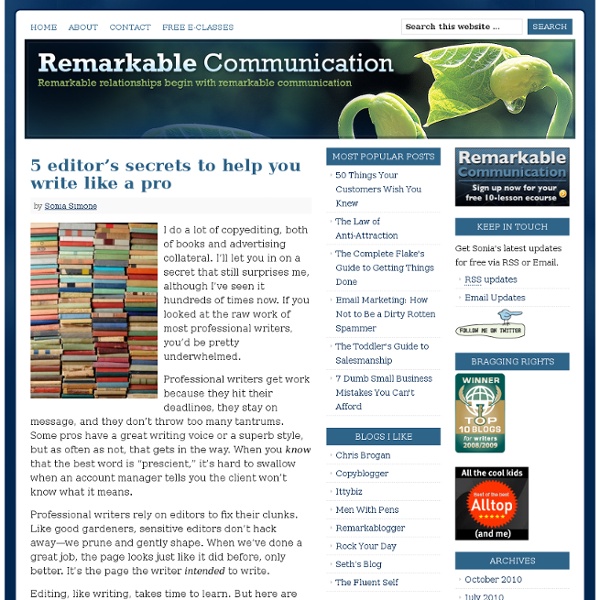Internet Resources - Writers Resources - Writing Links & Writers Links for Writers - Word Stuff
Unsorted [/writers] James Patrick Kelly - Murder Your Darlings - "When time comes to make that final revision, however, you must harden your heart, sharpen the ax and murder your darlings." Greda Vaso - Determining the Readability of a Book - includes formulas for Gunning's Fog Index, Flesch Formula, Powers Sumner Kearl L. Kip Wheeler - Literary Terms and Definitions L. Kip Wheeler - Comp - Lit - Poetry - Links - more Style - Grammar - Errors in English [/writers]American Heritage - Book of English Usage - free download Band-Aid AP StylebookPaul Brians - Common Errors in EnglishCJ Cherryh - Writerisms and other Sins The Chicago Manual of Style FAQ Gary N.
7 steps to creativity - how to have ideas
A guest post by Simon Townley of WriteMindset As a writer, having ideas is one of the most important parts of your craft. But often it seems like one of the most difficult and challenging parts of the whole process. How do you keep ideas flowing?
50 Incorrect Pronunciations That You Should Avoid
by Maeve Maddox Fred Astaire drew laughs back in the Thirties with his song “Let’s Call the Whole Thing Off” in which the lovers can’t agree on the pronunciation of words like either, neither, and tomato. On a personal level, I cringe when I hear someone sound the “t” in often or pronounce pecan with a short “a,” but I have to acknowledge that both these pronunciations are widely accepted alternate pronunciations that can be justified by the spelling.
(More) tips for writing well (Austin Govella at Thinking and Making)
Published Wed, Jul 8, 2009 by Austin Govella. Updated Wed, Jul 8, 2009. As an editor, I’ve noticed several recurring bad habits you heathens would do well to disabuse yourselves of immediately. Almost without exception, these bad habits instantiate themselves as a series of stock phrases and constructions that reflect a lack of focus, a lack of fully developed argument, or the kind of intellectual laziness that sets in as you slog through your first draft. These things happen, That’s ok.
11 Goal Hacks: How to Achieve Anything — PsyBlog - StumbleUpon
Goal-setting research on fantasising, visualisation, goal commitment, procrastination, the dark side of goal-setting and more… We’re all familiar with the nuts and bolts of goal-setting. We should set specific, challenging goals, use rewards, record progress and make public commitments (if you’re not familiar with these then check out this article on how to reach life goals).
short stories at east of the web
A game of Scrabble has serious consequences. - Length: 4 pages - Age Rating: PG - Genre: Crime, Humor
5 Freewriting Secrets for Being a "Genius"
You've heard of freewriting, certainly. At its most basic, it's about forcing your internal editor to stay away while you splash your most raw and unusual thoughts onto the page. In Accidental Genius: Using Writing to Generate Your Best Ideas, Insights, and Content (2nd edition, revised & updated), Mark Levy tells how he uses freewriting, not only to loosen up his writing muscles, but to solve business problems of all kinds. Levy, author, writing teacher, and marketing strategist, shares a few "secrets" for making freewriting an indispensible tool:
General Fiction
Getting Around... Career Essentials Getting Started Queries & Manuscripts Market Research Classes & Conferences Critiquing Crafting Your Work Grammar Guides Research/Interviewing Writing Contests The Writing Business Income & Expenses Selling Reprints Collaboration Pseudonyms Negotiating Contracts Setting Fees/Getting Paid Rights & Copyright Tech Tools
Jonathan Franzen’s 10 Rules of Writing
Last week, I posted about George Orwell’s rules for writing, so while I’m finishing book #12: The Corrections I thought this would be a great opportunity to check out what Jonathan Franzen has to say on the subject. This list came from The Guardian: The reader is a friend, not an adversary, not a spectator.Fiction that isn’t an author’s personal adventure into the frightening or the unknown isn’t worth writing for anything but money.Never use the word “then” as a conjunction– we have “and” for this purpose. Substituting “then” is the lazy or tone-deaf writer’s non-solution to the problem of too many “ands” on the page.Write in the third person unless a really distinctive first-person voice offers itself irresistibly.When information becomes free and universally accessible, voluminous research for a novel is devalued along with it.The most purely autobiographical fiction requires pure invention. I love #2. I don’t even write fiction, but somehow that resonates with me.
25 Insights on Becoming a Better Writer
When George Plimpton asked Ernest Hemingway what the best training for an aspiring writer would be in a 1954 interview, Hem replied, “Let’s say that he should go out and hang himself because he finds that writing well is impossibly difficult. Then he should be cut down without mercy and forced by his own self to write as well as he can for the rest of his life. At least he will have the story of the hanging to commence with.” Today, writing well is more important than ever.
Place Names
Let's say you've created a fictitious tavern, hamlet, village, town, city, realm, kingdom or planet for your story but you can't think of what to name it. Or the name you came up with for your fictitious tavern, hamlet, village, town city, realm, kingdom or planet makes your critique partner snort coffee out of her nose. Either way, you're in trouble. Let's cruise around some of the online place name generators, see how they can help, and grade them accordingly.



